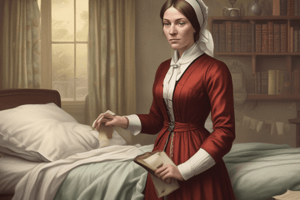Podcast
Questions and Answers
Where was Florence Nightingale born?
Where was Florence Nightingale born?
- Florence, Italy (correct)
- Kaiserswerth, Germany
- London, England
- Scutari, Turkey
What motivated Florence Nightingale to pursue a career in nursing?
What motivated Florence Nightingale to pursue a career in nursing?
- She was looking for a prestigious occupation
- She felt a strong desire to help others and serve society (correct)
- She wanted to follow in her parents' footsteps
- She was inspired by her family's wealth and social status
Where did Florence Nightingale receive training in nursing?
Where did Florence Nightingale receive training in nursing?
- The Institute of Lying-In in London (correct)
- The British General Hospital in Scutari, Turkey
- The Lutheran Hospital in Kaiserswerth, Germany
- The Nightingale School of Nursing
What was Florence Nightingale's nickname during the Crimean War?
What was Florence Nightingale's nickname during the Crimean War?
What was the outcome of Florence Nightingale's improvements in sanitation, hygiene, and patient care during the Crimean War?
What was the outcome of Florence Nightingale's improvements in sanitation, hygiene, and patient care during the Crimean War?
What was Florence Nightingale's contribution to the field of nursing?
What was Florence Nightingale's contribution to the field of nursing?
Study Notes
Early Life and Education
- Born on May 12, 1820, in Florence, Italy to a wealthy British family
- Raised in a family that valued education and social reform
- Showed early interest in statistics and mathematics
- Received education in various subjects, including languages, history, and science
Call to Nursing
- Experienced a "call to service" in 1837, feeling a strong desire to help others
- Faced resistance from family and society, as nursing was considered a lowly occupation for women of her social class
- Pursued her passion for nursing despite these obstacles
Training and Experience
- Received training at the Institute of Lying-In in London (1847)
- Worked at the Institute for the Care of Sick Gentlewomen in London (1849-1850)
- Traveled to Germany to study nursing at the Lutheran Hospital in Kaiserswerth (1850-1851)
Crimean War and the Lady with the Lamp
- Volunteered to provide nursing care during the Crimean War (1853-1856)
- Appointed as the Superintendent of the Female Nurses at the British General Hospital in Scutari, Turkey
- Implemented improvements in sanitation, hygiene, and patient care, significantly reducing mortality rates
- Became known as the "Lady with the Lamp" due to her nightly rounds, comforting patients and earning their respect and admiration
Contributions to Nursing and Statistics
- Established the first professional nursing school in the world, the Nightingale School of Nursing, at St. Thomas' Hospital in London (1860)
- Published "Notes on Nursing" (1859), a book that emphasized the importance of sanitation, hygiene, and compassionate care
- Developed the Polar Area Diagram, a statistical tool used to visualize mortality rates and improve hospital sanitation
- Advocated for improved hospital design, statistics, and patient care throughout her life
Legacy
- Regarded as the founder of modern nursing
- Inspired countless women to pursue careers in nursing
- Continued to influence healthcare policy and practice until her death on August 13, 1910
Early Life and Education
- Florence Nightingale was born on May 12, 1820, in Florence, Italy, to a wealthy British family that valued education and social reform.
- She showed an early interest in statistics and mathematics and received a well-rounded education in languages, history, and science.
Call to Nursing
- In 1837, Nightingale experienced a "call to service," feeling a strong desire to help others, despite her family and society considering nursing a lowly occupation for women of her social class.
Training and Experience
- In 1847, Nightingale received training at the Institute of Lying-In in London.
- She worked at the Institute for the Care of Sick Gentlewomen in London from 1849 to 1850.
- In 1850-1851, she traveled to Germany to study nursing at the Lutheran Hospital in Kaiserswerth.
Crimean War and the Lady with the Lamp
- During the Crimean War (1853-1856), Nightingale volunteered to provide nursing care.
- She was appointed Superintendent of the Female Nurses at the British General Hospital in Scutari, Turkey.
- She implemented improvements in sanitation, hygiene, and patient care, significantly reducing mortality rates.
- Her nightly rounds, comforting patients and earning their respect and admiration, earned her the nickname "Lady with the Lamp."
Contributions to Nursing and Statistics
- In 1860, Nightingale established the world's first professional nursing school, the Nightingale School of Nursing, at St.Thomas' Hospital in London.
- She published "Notes on Nursing" (1859), emphasizing the importance of sanitation, hygiene, and compassionate care.
- She developed the Polar Area Diagram, a statistical tool used to visualize mortality rates and improve hospital sanitation.
- Nightingale advocated for improved hospital design, statistics, and patient care throughout her life.
Legacy
- Florence Nightingale is regarded as the founder of modern nursing.
- She inspired countless women to pursue careers in nursing.
- Her influence on healthcare policy and practice continued until her death on August 13, 1910.
Studying That Suits You
Use AI to generate personalized quizzes and flashcards to suit your learning preferences.
Description
Learn about the early life and education of Florence Nightingale, the founder of modern nursing. From her birth in Florence to her call to service, understand the influences that shaped her life and work.




